
Language Policy
Scope & Guideline
Navigating the Nuances of Language and Culture
Introduction
Aims and Scopes
- Language Education Policy:
Focuses on the development, implementation, and outcomes of language education policies, particularly in multilingual and multicultural settings. - Language Rights and Advocacy:
Examines the rights of individuals and communities regarding language use, including advocacy efforts for minority languages and the implications of language policies on social equity. - Political and Ideological Dimensions of Language Policy:
Analyzes how language policies reflect and shape political ideologies, power dynamics, and social hierarchies within different contexts. - Language and Identity:
Investigates the relationship between language use and identity formation, particularly in contexts of migration, diaspora, and cultural integration. - Critical Language Policy Studies:
Employs critical frameworks to interrogate language policies, focusing on issues of race, class, and power in language planning and practice. - Language Revitalization and Preservation:
Explores initiatives aimed at revitalizing endangered languages, including community-based efforts and educational programs. - Impact of Globalization on Language Policy:
Considers how globalization influences language policies and practices, particularly in relation to English as a global language.
Trending and Emerging
- Raciolinguistic Perspectives:
An emerging focus on raciolinguistic ideologies highlights the intersection of race and language in policy discussions, emphasizing how language use is intertwined with racial identity and power. - Community-Based Language Policies:
There is a growing interest in grassroots language policy initiatives that empower local communities, particularly in the context of language revitalization and cultural preservation. - Language Policy in Conflict Zones:
Research addressing language policy in contexts of conflict and social unrest is gaining prominence, reflecting the need to understand how language can be both a tool for reconciliation and a source of division. - Transnational Language Practices:
Studies exploring language practices among transnational communities are on the rise, highlighting the complexities of language use in global migration and diaspora contexts. - Digital Communication and Language Policy:
The impact of digital communication on language use and policy is increasingly recognized, as researchers examine how technology influences language practices and policy implementation. - Language Policy and Social Justice:
A heightened focus on the implications of language policy for social justice and equity, particularly in relation to marginalized communities and minority languages, is evident in recent publications.
Declining or Waning
- Traditional Bilingual Education Models:
Research related to conventional bilingual education models has decreased, possibly as new frameworks and approaches to multilingual education gain traction. - Monolingual Language Policies:
There has been a noticeable decline in studies focusing solely on monolingual language policies, as discussions increasingly shift towards multilingual and inclusive approaches. - Language Testing and Assessment:
Research on standardized language testing and assessment practices has waned, suggesting a shift towards more holistic and formative approaches to language evaluation. - Language Policy in Post-Colonial Contexts:
While still relevant, the focus on language policy specifically in post-colonial contexts has diminished, potentially due to a broader emphasis on transnational and global language issues. - Language Policy in Higher Education:
Although still important, the specific scrutiny of language policy within higher education settings appears less frequent, as broader educational policy themes take precedence.
Similar Journals

Revista de Llengua i Dret-Journal of Language and Law
Exploring the Intersection of Language and Legal ThoughtRevista de Llengua i Dret - Journal of Language and Law, published by the esteemed Escola Adm Publica Catalunya, stands at the intersection of linguistics and law, promoting interdisciplinary dialogue and research since its inception in 1983. This Open Access journal welcomes submissions that explore the dynamic relationships between language and legal concepts, providing insights that are essential for researchers, legal professionals, and students alike. With its impactful presence, the journal boasts a 2023 Scopus ranking in the Q2 quartile for Linguistics and Language, and a Q3 ranking in Law, positioning it as a vital resource within these fields. The journal is based in Barcelona, Spain, and is dedicated to advancing scholarship while fostering accessible dialogue across linguistic and legal disciplines. As the convergence of language and law continues to evolve, Revista de Llengua i Dret serves as a critical platform for innovative research and discourse.
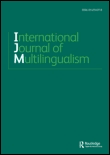
International Journal of Multilingualism
Championing impactful research in language studies.Welcome to the International Journal of Multilingualism, a leading platform dedicated to advancing the field of linguistics and language studies. Established by ROUTLEDGE JOURNALS, TAYLOR & FRANCIS LTD and housed in the United Kingdom, this journal has rapidly ascended to a prestigious Q1 quartile status in both the Linguistics and Language categories as of 2023, ranking in the top 4% across related disciplines. With a remarkable Scopus ranking of #35 in Arts and Humanities and #38 in Social Sciences, it is recognized for publishing high-quality, impactful research that spans a diverse array of multilingual topics. The journal thrives on its commitment to examining the complexities and dynamics of multilingualism in contemporary society, making it an essential resource for researchers, professionals, and students alike. Although Open Access options are not currently available, the journal's rigorous peer-review process ensures that each publication contributes valuable insights into the field. Since its inception in 2004, the International Journal of Multilingualism continues to foster academic discourse and innovation, solidifying its role as a crucial outlet for scholarly work by 2024 and beyond.
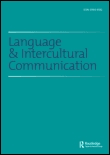
Language and Intercultural Communication
Enriching Perspectives in Language and Intercultural StudiesLanguage and Intercultural Communication is a leading peer-reviewed journal published by Routledge Journals, Taylor & Francis Ltd, based in the United Kingdom. With an ISSN of 1470-8477 and an E-ISSN of 1747-759X, this esteemed publication has established itself as a vital resource in the fields of Communication and Linguistics, boasting an impressive Q1 classification in both categories as of 2023. The journal's scope encompasses a broad range of topics related to language and its role in intercultural contexts, making it an essential platform for researchers, professionals, and students alike who wish to contribute to and learn from the latest scholarly discussions. Even without an open-access option, its high impact factor and strong Scopus rankings, which place it in the 87th percentile for Linguistics and Language, affirm its significance in shaping contemporary dialogue. As we move towards 2024, Language and Intercultural Communication continues to foster academic exchanges that challenge, expand, and enrich understanding across diverse linguistic and cultural landscapes, making it a must-read for anyone interested in the intersection of language and culture.
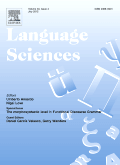
LANGUAGE SCIENCES
Advancing Knowledge in Language and CognitionLANGUAGE SCIENCES, published by Elsevier Science Ltd, stands as a prominent journal in the field of linguistics and language studies. With an impressive impact factor that solidifies its reputation, it holds a Q1 ranking in both the linguistics and language categories for 2023, reflecting its excellence and relevance in cutting-edge research. Since its inception in 1979, this journal has evolved to encompass a wide range of interdisciplinary studies, providing a platform for innovative research that addresses the complexities of language use, acquisition, cognition, and social interactions. The journal is hosted in the United Kingdom and features rigorous peer-reviewed articles that contribute significantly to both the academic community and practical applications in language-related fields. With access options tailored for a diverse range of readers and contributors, LANGUAGE SCIENCES invites scholars, students, and professionals to engage with its comprehensive body of work and contribute to the ongoing discourse in linguistics.
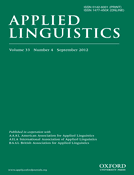
APPLIED LINGUISTICS
Connecting Scholars Through Language and CommunicationApplied Linguistics, published by Oxford University Press, is a premier scholarly journal that has significantly contributed to the fields of linguistics and communication since its inception in 1980. With an impressive impact factor and ranked in the top quartile (Q1) in both Communication and Linguistics and Language categories, Applied Linguistics is recognized for its rigorous peer-reviewed articles that explore the intersections of language, society, and cognition. The journal enjoys a remarkable position in the Scopus rankings, placing it among the top 2% of publications in its discipline. Researchers, professionals, and students benefit from its comprehensive scope, which encompasses innovative research on language acquisition, discourse analysis, and applied linguistics methodologies. Although not an open access journal, its commitment to advancing knowledge and fostering academic discussions makes it an indispensable resource for anyone interested in the critical role of language in various contexts.
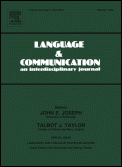
LANGUAGE & COMMUNICATION
Empowering researchers with cutting-edge insights into language.LANGUAGE & COMMUNICATION is a prestigious journal published by PERGAMON-ELSEVIER SCIENCE LTD that serves as an essential resource for researchers and practitioners in the fields of communication, linguistics, and psychology. With a focus on interdisciplinary approaches, this journal has maintained a strong impact, as evidenced by its high rankings—Q1 status in communication and linguistics, and notable categories in experimental and cognitive psychology, as highlighted by the 2023 Scopus rankings. Established in 1981, LANGUAGE & COMMUNICATION combines rigorous empirical research with practical applications, making it a critical forum for advancing understanding in language use and communication theory. While currently not an Open Access journal, it offers vital insights to academics and professionals alike, facilitating knowledge dissemination and sparking meaningful dialogue within the community. Its commitment to excellence is further demonstrated by its contributions to key areas of study, positioning it as a vital publication for anyone invested in the exploration of language and human interaction.
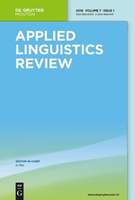
Applied Linguistics Review
Advancing the frontiers of language research.Applied Linguistics Review is a leading academic journal published by WALTER DE GRUYTER GMBH, focusing on the dynamic field of linguistics and language studies. With an impressive Q1 quartile ranking in both Linguistics and Language and Social Sciences, the journal positions itself at the forefront of research, making it a crucial resource for scholars and professionals alike. The journal aims to foster scholarly dialogue by publishing high-quality, peer-reviewed articles that explore theoretical frameworks, empirical studies, and innovative methodologies in applied linguistics. Operating from Poland with an international reach, it is committed to advancing knowledge in areas such as language acquisition, language policy, and multilingualism. Its notable performance can be seen in its Scopus rankings, where it stands at #72 out of 1088 in the Arts and Humanities category and #86 out of 1167 in Social Sciences. The Applied Linguistics Review serves as an invaluable platform for researchers, educators, and students to disseminate and engage with cutting-edge research, thereby enhancing their understanding and application of linguistic principles in diverse contexts.
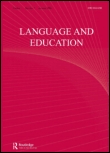
Language and Education
Shaping the Future of Language Acquisition and PedagogyLanguage and Education is a leading academic journal published by Routledge Journals, Taylor & Francis Ltd, specializing in the intersection of language studies and educational practices. With an impressive Q1 ranking in both Education and Linguistics and Language categories for 2023, it stands out as a crucial resource for researchers, educators, and industry professionals. Covering a wide array of topics pertinent to language acquisition, pedagogical methodologies, and culturally responsive education, this journal supports rigorous scholarship in the field. While not currently offering open access options, its contributions are vital for advancing knowledge and fostering innovation across disciplines. The journal's long-term commitment to excellence is evidenced by its high rankings in Scopus, placing it in the 94th percentile in Language and Linguistics and the 80th percentile in Education. Since its inception in 1987, Language and Education has not only tracked the evolving landscape of language education but has also actively shaped it, making it an indispensable tool for anyone invested in educational research and practice.

Slovo a Slovesnost
Nurturing Excellence in Language StudiesSlovo a Slovesnost is a prominent academic journal dedicated to the field of linguistics and language studies, published by the Czech Language Institute of the Czech Academy of Sciences. With an ISSN of 0037-7031, the journal has established itself as a significant resource for researchers and professionals within the linguistic community. Its rigorous selection process and impactful contributions have earned it a commendable Q2 ranking in Linguistics and Language as of 2023, as well as Scopus rankings in the 58th percentile for Language and Linguistics. Offering insights into both theoretical and applied linguistics, Slovo a Slovesnost serves as an essential platform for cutting-edge research, fostering dialogue among scholars, and enriching the study of language within the Czech Republic and beyond. Although it does not provide open access, the journal supports a subscription model that ensures high-quality dissemination of knowledge to a dedicated audience of linguists, educators, and linguistic scholars. With coverage converging from 2004 to 2024, it continues to thrive as a vital corner of linguistic scholarship.
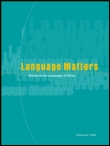
Language Matters
Elevating Research in Linguistics and CommunicationLanguage Matters is a prestigious journal dedicated to the dynamic field of Linguistics and Language, published by Routledge Journals, Taylor & Francis Ltd in the United Kingdom. With an ISSN of 1022-8195 and an E-ISSN of 1753-5395, this journal serves as an essential platform for scholars seeking to explore the multifaceted relationships between language and society. Recognized in the 2023 Category Quartiles as Q2 in Linguistics and Language, it boasts impressive Scopus rankings, sitting at #298 out of 1088 in the Arts and Humanities category and #356 out of 1167 in Social Sciences, highlighting its significant impact on the field with a 72nd and 69th percentile ranking, respectively. The journal's scope encompasses a wide range of topics including language acquisition, sociolinguistics, and psycholinguistics, making it a vital resource for researchers, educators, and students alike. By not offering open access, it maintains a curated selection of high-quality peer-reviewed articles, ensuring that academic rigor and relevance are upheld for its readership. With a publication range spanning from 1993 to 2024, Language Matters continues to shape conversations and advance knowledge in the ever-evolving landscape of linguistic research.